Reflexive Consciousness and Self-Awareness: A Report Analysis
VerifiedAdded on 2020/10/22
|11
|3463
|306
Report
AI Summary
This report examines the concept of reflexive practice, focusing on the development of reflexive consciousness and self-awareness among practitioners. It begins with an introduction outlining the aims of the research, which include evaluating reflexivity in various professional contexts, particularly in counselling programs. The literature review explores different frameworks and theories related to reflective practice, including the Alvason Metaphor Framework and the views of various authors on self-awareness, reflective writing, and the importance of self-reflection for personal and professional growth. The research methodology section details the methods used, such as action research, reflexivity, art-based reflection, and auto-ethnographic practices, to analyze the experiences of practitioners. The data analysis section applies Gibbs Reflective Cycle to understand the stages of reflection: description, feelings, evaluation, analysis, conclusion, and action plan. Part C presents a storyboard illustrating a practical application of the reflexive practitioner's role. The report emphasizes the value of critical thinking, self-reflection, and continuous improvement for practitioners to enhance their skills and navigate complex situations effectively.
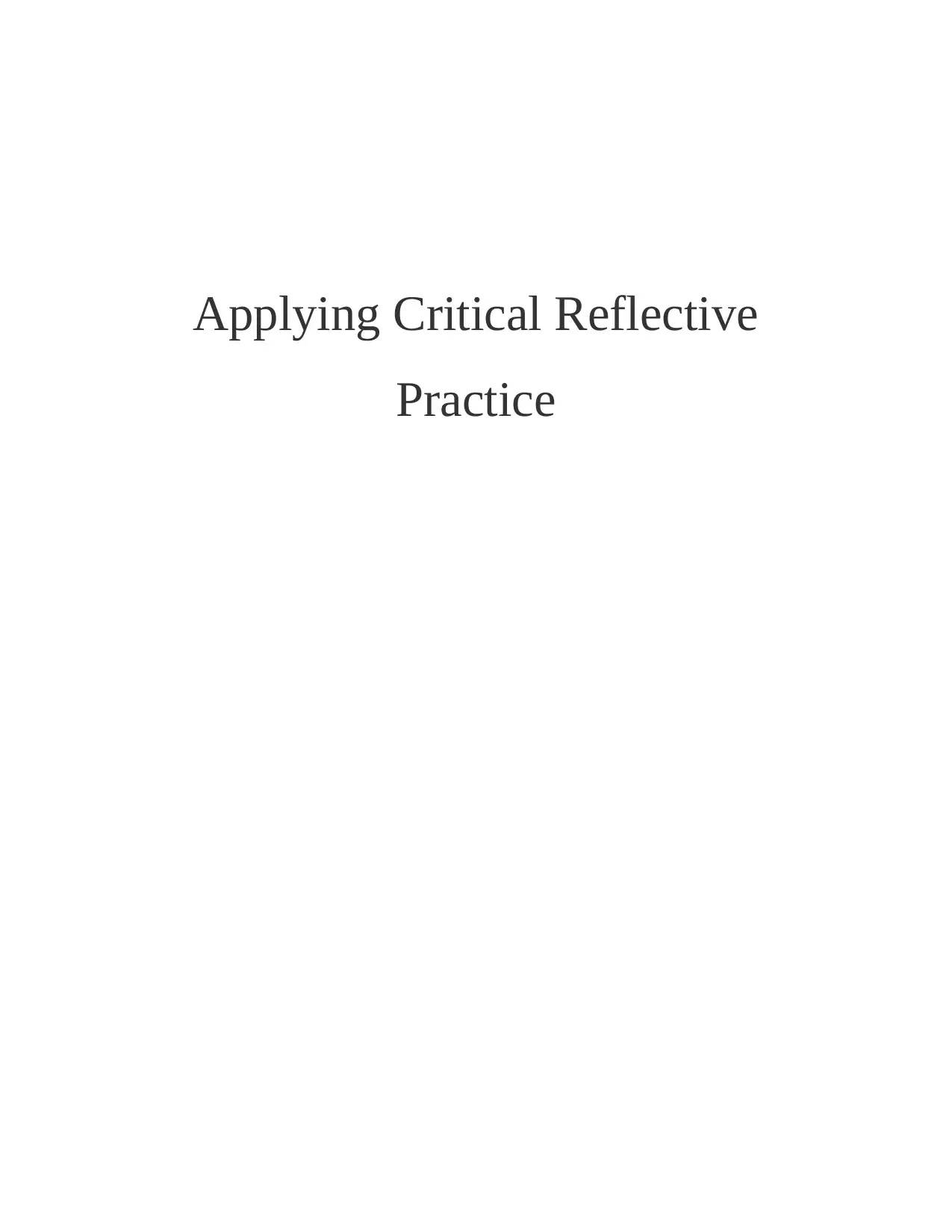
Applying Critical Reflective
Practice
Practice
Paraphrase This Document
Need a fresh take? Get an instant paraphrase of this document with our AI Paraphraser
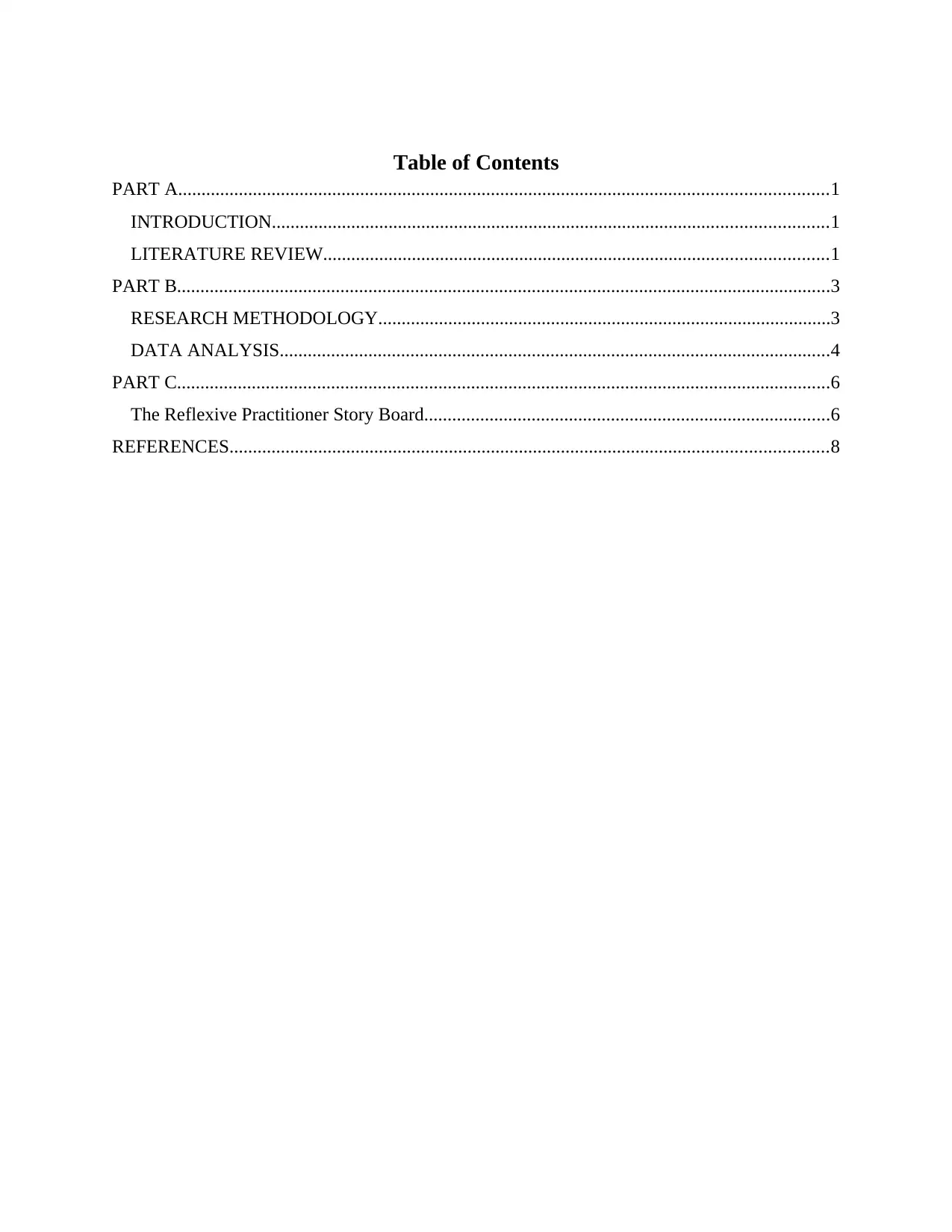
Table of Contents
PART A...........................................................................................................................................1
INTRODUCTION.......................................................................................................................1
LITERATURE REVIEW............................................................................................................1
PART B............................................................................................................................................3
RESEARCH METHODOLOGY.................................................................................................3
DATA ANALYSIS......................................................................................................................4
PART C............................................................................................................................................6
The Reflexive Practitioner Story Board.......................................................................................6
REFERENCES................................................................................................................................8
PART A...........................................................................................................................................1
INTRODUCTION.......................................................................................................................1
LITERATURE REVIEW............................................................................................................1
PART B............................................................................................................................................3
RESEARCH METHODOLOGY.................................................................................................3
DATA ANALYSIS......................................................................................................................4
PART C............................................................................................................................................6
The Reflexive Practitioner Story Board.......................................................................................6
REFERENCES................................................................................................................................8
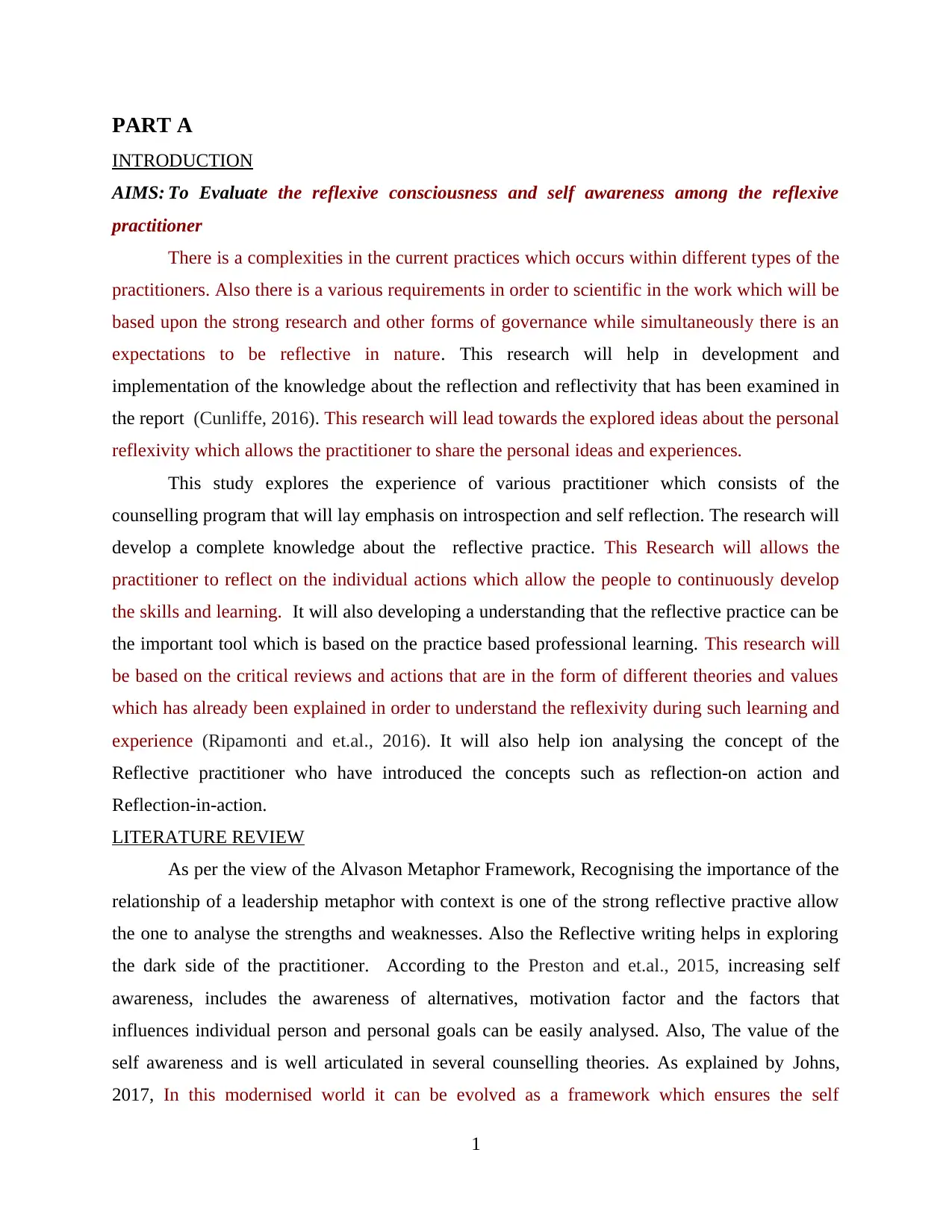
PART A
INTRODUCTION
AIMS: To Evaluate the reflexive consciousness and self awareness among the reflexive
practitioner
There is a complexities in the current practices which occurs within different types of the
practitioners. Also there is a various requirements in order to scientific in the work which will be
based upon the strong research and other forms of governance while simultaneously there is an
expectations to be reflective in nature. This research will help in development and
implementation of the knowledge about the reflection and reflectivity that has been examined in
the report (Cunliffe, 2016). This research will lead towards the explored ideas about the personal
reflexivity which allows the practitioner to share the personal ideas and experiences.
This study explores the experience of various practitioner which consists of the
counselling program that will lay emphasis on introspection and self reflection. The research will
develop a complete knowledge about the reflective practice. This Research will allows the
practitioner to reflect on the individual actions which allow the people to continuously develop
the skills and learning. It will also developing a understanding that the reflective practice can be
the important tool which is based on the practice based professional learning. This research will
be based on the critical reviews and actions that are in the form of different theories and values
which has already been explained in order to understand the reflexivity during such learning and
experience (Ripamonti and et.al., 2016). It will also help ion analysing the concept of the
Reflective practitioner who have introduced the concepts such as reflection-on action and
Reflection-in-action.
LITERATURE REVIEW
As per the view of the Alvason Metaphor Framework, Recognising the importance of the
relationship of a leadership metaphor with context is one of the strong reflective practive allow
the one to analyse the strengths and weaknesses. Also the Reflective writing helps in exploring
the dark side of the practitioner. According to the Preston and et.al., 2015, increasing self
awareness, includes the awareness of alternatives, motivation factor and the factors that
influences individual person and personal goals can be easily analysed. Also, The value of the
self awareness and is well articulated in several counselling theories. As explained by Johns,
2017, In this modernised world it can be evolved as a framework which ensures the self
1
INTRODUCTION
AIMS: To Evaluate the reflexive consciousness and self awareness among the reflexive
practitioner
There is a complexities in the current practices which occurs within different types of the
practitioners. Also there is a various requirements in order to scientific in the work which will be
based upon the strong research and other forms of governance while simultaneously there is an
expectations to be reflective in nature. This research will help in development and
implementation of the knowledge about the reflection and reflectivity that has been examined in
the report (Cunliffe, 2016). This research will lead towards the explored ideas about the personal
reflexivity which allows the practitioner to share the personal ideas and experiences.
This study explores the experience of various practitioner which consists of the
counselling program that will lay emphasis on introspection and self reflection. The research will
develop a complete knowledge about the reflective practice. This Research will allows the
practitioner to reflect on the individual actions which allow the people to continuously develop
the skills and learning. It will also developing a understanding that the reflective practice can be
the important tool which is based on the practice based professional learning. This research will
be based on the critical reviews and actions that are in the form of different theories and values
which has already been explained in order to understand the reflexivity during such learning and
experience (Ripamonti and et.al., 2016). It will also help ion analysing the concept of the
Reflective practitioner who have introduced the concepts such as reflection-on action and
Reflection-in-action.
LITERATURE REVIEW
As per the view of the Alvason Metaphor Framework, Recognising the importance of the
relationship of a leadership metaphor with context is one of the strong reflective practive allow
the one to analyse the strengths and weaknesses. Also the Reflective writing helps in exploring
the dark side of the practitioner. According to the Preston and et.al., 2015, increasing self
awareness, includes the awareness of alternatives, motivation factor and the factors that
influences individual person and personal goals can be easily analysed. Also, The value of the
self awareness and is well articulated in several counselling theories. As explained by Johns,
2017, In this modernised world it can be evolved as a framework which ensures the self
1
⊘ This is a preview!⊘
Do you want full access?
Subscribe today to unlock all pages.

Trusted by 1+ million students worldwide
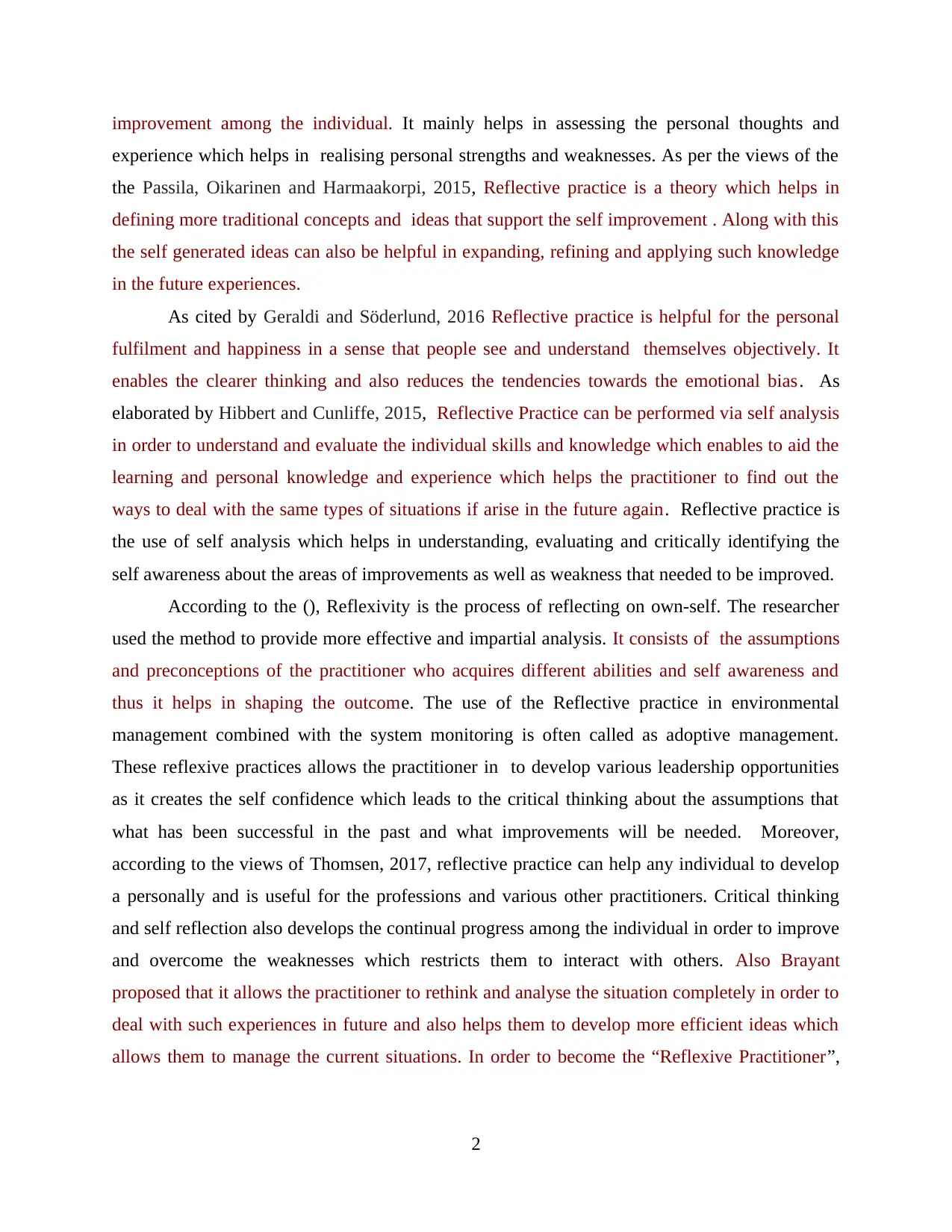
improvement among the individual. It mainly helps in assessing the personal thoughts and
experience which helps in realising personal strengths and weaknesses. As per the views of the
the Passila, Oikarinen and Harmaakorpi, 2015, Reflective practice is a theory which helps in
defining more traditional concepts and ideas that support the self improvement . Along with this
the self generated ideas can also be helpful in expanding, refining and applying such knowledge
in the future experiences.
As cited by Geraldi and Söderlund, 2016 Reflective practice is helpful for the personal
fulfilment and happiness in a sense that people see and understand themselves objectively. It
enables the clearer thinking and also reduces the tendencies towards the emotional bias. As
elaborated by Hibbert and Cunliffe, 2015, Reflective Practice can be performed via self analysis
in order to understand and evaluate the individual skills and knowledge which enables to aid the
learning and personal knowledge and experience which helps the practitioner to find out the
ways to deal with the same types of situations if arise in the future again. Reflective practice is
the use of self analysis which helps in understanding, evaluating and critically identifying the
self awareness about the areas of improvements as well as weakness that needed to be improved.
According to the (), Reflexivity is the process of reflecting on own-self. The researcher
used the method to provide more effective and impartial analysis. It consists of the assumptions
and preconceptions of the practitioner who acquires different abilities and self awareness and
thus it helps in shaping the outcome. The use of the Reflective practice in environmental
management combined with the system monitoring is often called as adoptive management.
These reflexive practices allows the practitioner in to develop various leadership opportunities
as it creates the self confidence which leads to the critical thinking about the assumptions that
what has been successful in the past and what improvements will be needed. Moreover,
according to the views of Thomsen, 2017, reflective practice can help any individual to develop
a personally and is useful for the professions and various other practitioners. Critical thinking
and self reflection also develops the continual progress among the individual in order to improve
and overcome the weaknesses which restricts them to interact with others. Also Brayant
proposed that it allows the practitioner to rethink and analyse the situation completely in order to
deal with such experiences in future and also helps them to develop more efficient ideas which
allows them to manage the current situations. In order to become the “Reflexive Practitioner”,
2
experience which helps in realising personal strengths and weaknesses. As per the views of the
the Passila, Oikarinen and Harmaakorpi, 2015, Reflective practice is a theory which helps in
defining more traditional concepts and ideas that support the self improvement . Along with this
the self generated ideas can also be helpful in expanding, refining and applying such knowledge
in the future experiences.
As cited by Geraldi and Söderlund, 2016 Reflective practice is helpful for the personal
fulfilment and happiness in a sense that people see and understand themselves objectively. It
enables the clearer thinking and also reduces the tendencies towards the emotional bias. As
elaborated by Hibbert and Cunliffe, 2015, Reflective Practice can be performed via self analysis
in order to understand and evaluate the individual skills and knowledge which enables to aid the
learning and personal knowledge and experience which helps the practitioner to find out the
ways to deal with the same types of situations if arise in the future again. Reflective practice is
the use of self analysis which helps in understanding, evaluating and critically identifying the
self awareness about the areas of improvements as well as weakness that needed to be improved.
According to the (), Reflexivity is the process of reflecting on own-self. The researcher
used the method to provide more effective and impartial analysis. It consists of the assumptions
and preconceptions of the practitioner who acquires different abilities and self awareness and
thus it helps in shaping the outcome. The use of the Reflective practice in environmental
management combined with the system monitoring is often called as adoptive management.
These reflexive practices allows the practitioner in to develop various leadership opportunities
as it creates the self confidence which leads to the critical thinking about the assumptions that
what has been successful in the past and what improvements will be needed. Moreover,
according to the views of Thomsen, 2017, reflective practice can help any individual to develop
a personally and is useful for the professions and various other practitioners. Critical thinking
and self reflection also develops the continual progress among the individual in order to improve
and overcome the weaknesses which restricts them to interact with others. Also Brayant
proposed that it allows the practitioner to rethink and analyse the situation completely in order to
deal with such experiences in future and also helps them to develop more efficient ideas which
allows them to manage the current situations. In order to become the “Reflexive Practitioner”,
2
Paraphrase This Document
Need a fresh take? Get an instant paraphrase of this document with our AI Paraphraser
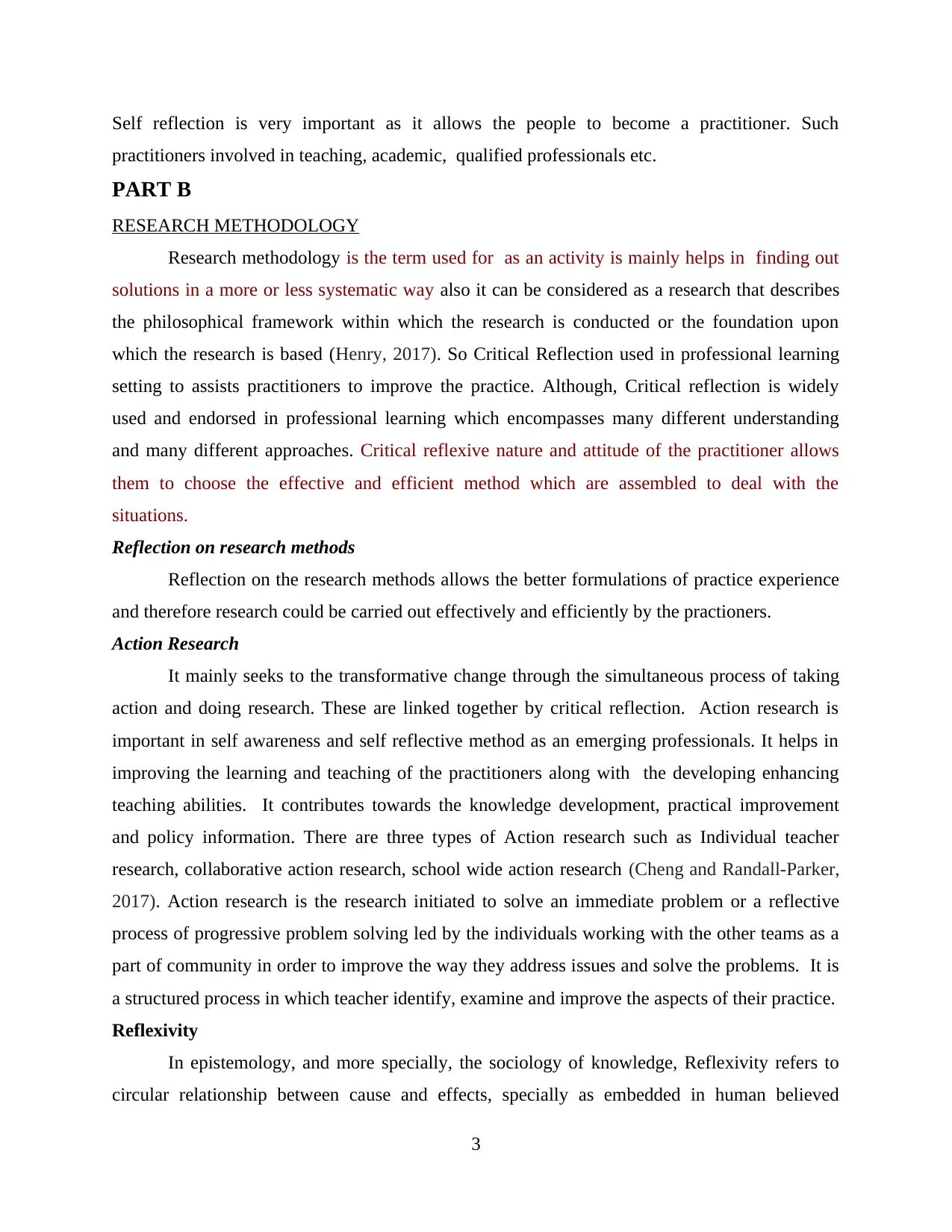
Self reflection is very important as it allows the people to become a practitioner. Such
practitioners involved in teaching, academic, qualified professionals etc.
PART B
RESEARCH METHODOLOGY
Research methodology is the term used for as an activity is mainly helps in finding out
solutions in a more or less systematic way also it can be considered as a research that describes
the philosophical framework within which the research is conducted or the foundation upon
which the research is based (Henry, 2017). So Critical Reflection used in professional learning
setting to assists practitioners to improve the practice. Although, Critical reflection is widely
used and endorsed in professional learning which encompasses many different understanding
and many different approaches. Critical reflexive nature and attitude of the practitioner allows
them to choose the effective and efficient method which are assembled to deal with the
situations.
Reflection on research methods
Reflection on the research methods allows the better formulations of practice experience
and therefore research could be carried out effectively and efficiently by the practioners.
Action Research
It mainly seeks to the transformative change through the simultaneous process of taking
action and doing research. These are linked together by critical reflection. Action research is
important in self awareness and self reflective method as an emerging professionals. It helps in
improving the learning and teaching of the practitioners along with the developing enhancing
teaching abilities. It contributes towards the knowledge development, practical improvement
and policy information. There are three types of Action research such as Individual teacher
research, collaborative action research, school wide action research (Cheng and Randall-Parker,
2017). Action research is the research initiated to solve an immediate problem or a reflective
process of progressive problem solving led by the individuals working with the other teams as a
part of community in order to improve the way they address issues and solve the problems. It is
a structured process in which teacher identify, examine and improve the aspects of their practice.
Reflexivity
In epistemology, and more specially, the sociology of knowledge, Reflexivity refers to
circular relationship between cause and effects, specially as embedded in human believed
3
practitioners involved in teaching, academic, qualified professionals etc.
PART B
RESEARCH METHODOLOGY
Research methodology is the term used for as an activity is mainly helps in finding out
solutions in a more or less systematic way also it can be considered as a research that describes
the philosophical framework within which the research is conducted or the foundation upon
which the research is based (Henry, 2017). So Critical Reflection used in professional learning
setting to assists practitioners to improve the practice. Although, Critical reflection is widely
used and endorsed in professional learning which encompasses many different understanding
and many different approaches. Critical reflexive nature and attitude of the practitioner allows
them to choose the effective and efficient method which are assembled to deal with the
situations.
Reflection on research methods
Reflection on the research methods allows the better formulations of practice experience
and therefore research could be carried out effectively and efficiently by the practioners.
Action Research
It mainly seeks to the transformative change through the simultaneous process of taking
action and doing research. These are linked together by critical reflection. Action research is
important in self awareness and self reflective method as an emerging professionals. It helps in
improving the learning and teaching of the practitioners along with the developing enhancing
teaching abilities. It contributes towards the knowledge development, practical improvement
and policy information. There are three types of Action research such as Individual teacher
research, collaborative action research, school wide action research (Cheng and Randall-Parker,
2017). Action research is the research initiated to solve an immediate problem or a reflective
process of progressive problem solving led by the individuals working with the other teams as a
part of community in order to improve the way they address issues and solve the problems. It is
a structured process in which teacher identify, examine and improve the aspects of their practice.
Reflexivity
In epistemology, and more specially, the sociology of knowledge, Reflexivity refers to
circular relationship between cause and effects, specially as embedded in human believed
3
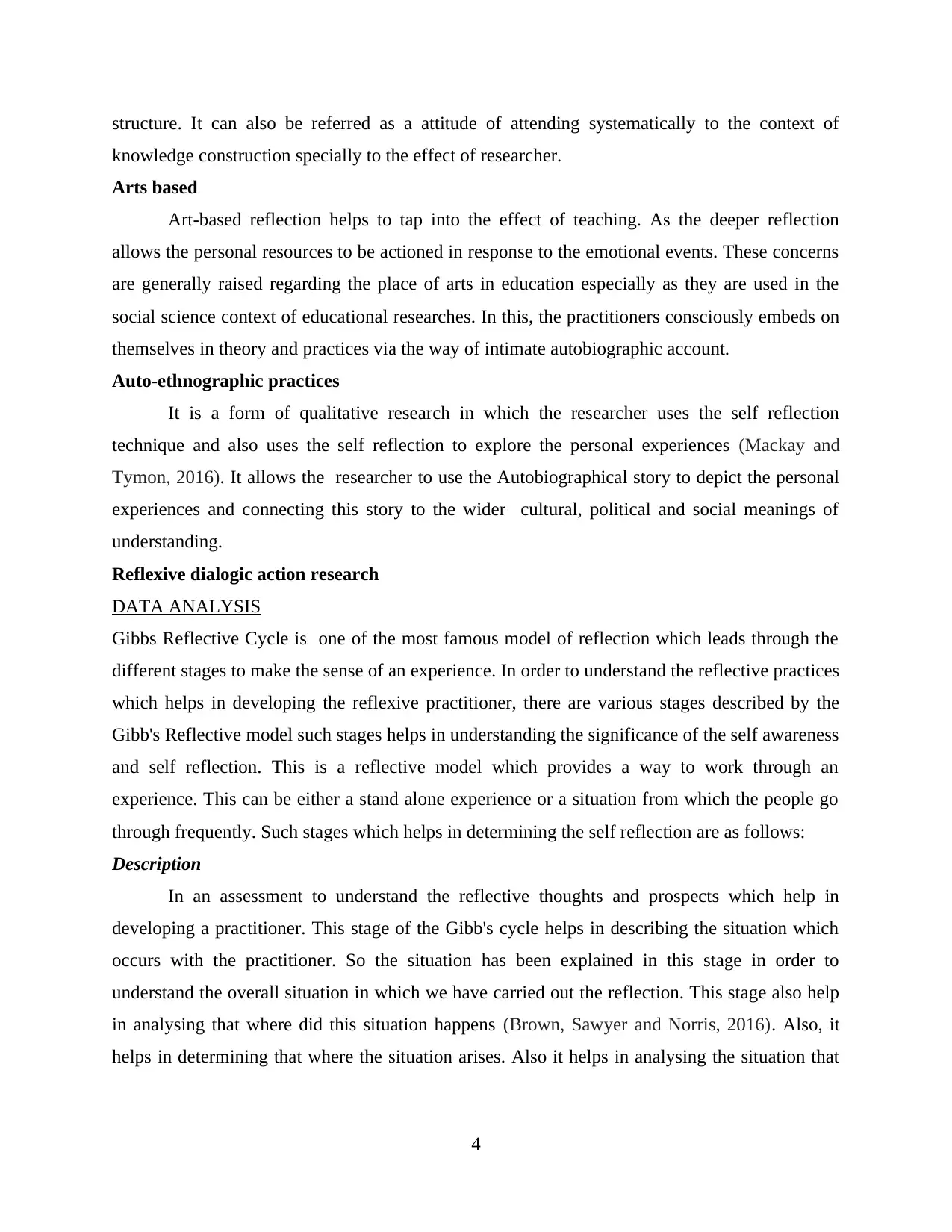
structure. It can also be referred as a attitude of attending systematically to the context of
knowledge construction specially to the effect of researcher.
Arts based
Art-based reflection helps to tap into the effect of teaching. As the deeper reflection
allows the personal resources to be actioned in response to the emotional events. These concerns
are generally raised regarding the place of arts in education especially as they are used in the
social science context of educational researches. In this, the practitioners consciously embeds on
themselves in theory and practices via the way of intimate autobiographic account.
Auto-ethnographic practices
It is a form of qualitative research in which the researcher uses the self reflection
technique and also uses the self reflection to explore the personal experiences (Mackay and
Tymon, 2016). It allows the researcher to use the Autobiographical story to depict the personal
experiences and connecting this story to the wider cultural, political and social meanings of
understanding.
Reflexive dialogic action research
DATA ANALYSIS
Gibbs Reflective Cycle is one of the most famous model of reflection which leads through the
different stages to make the sense of an experience. In order to understand the reflective practices
which helps in developing the reflexive practitioner, there are various stages described by the
Gibb's Reflective model such stages helps in understanding the significance of the self awareness
and self reflection. This is a reflective model which provides a way to work through an
experience. This can be either a stand alone experience or a situation from which the people go
through frequently. Such stages which helps in determining the self reflection are as follows:
Description
In an assessment to understand the reflective thoughts and prospects which help in
developing a practitioner. This stage of the Gibb's cycle helps in describing the situation which
occurs with the practitioner. So the situation has been explained in this stage in order to
understand the overall situation in which we have carried out the reflection. This stage also help
in analysing that where did this situation happens (Brown, Sawyer and Norris, 2016). Also, it
helps in determining that where the situation arises. Also it helps in analysing the situation that
4
knowledge construction specially to the effect of researcher.
Arts based
Art-based reflection helps to tap into the effect of teaching. As the deeper reflection
allows the personal resources to be actioned in response to the emotional events. These concerns
are generally raised regarding the place of arts in education especially as they are used in the
social science context of educational researches. In this, the practitioners consciously embeds on
themselves in theory and practices via the way of intimate autobiographic account.
Auto-ethnographic practices
It is a form of qualitative research in which the researcher uses the self reflection
technique and also uses the self reflection to explore the personal experiences (Mackay and
Tymon, 2016). It allows the researcher to use the Autobiographical story to depict the personal
experiences and connecting this story to the wider cultural, political and social meanings of
understanding.
Reflexive dialogic action research
DATA ANALYSIS
Gibbs Reflective Cycle is one of the most famous model of reflection which leads through the
different stages to make the sense of an experience. In order to understand the reflective practices
which helps in developing the reflexive practitioner, there are various stages described by the
Gibb's Reflective model such stages helps in understanding the significance of the self awareness
and self reflection. This is a reflective model which provides a way to work through an
experience. This can be either a stand alone experience or a situation from which the people go
through frequently. Such stages which helps in determining the self reflection are as follows:
Description
In an assessment to understand the reflective thoughts and prospects which help in
developing a practitioner. This stage of the Gibb's cycle helps in describing the situation which
occurs with the practitioner. So the situation has been explained in this stage in order to
understand the overall situation in which we have carried out the reflection. This stage also help
in analysing that where did this situation happens (Brown, Sawyer and Norris, 2016). Also, it
helps in determining that where the situation arises. Also it helps in analysing the situation that
4
⊘ This is a preview!⊘
Do you want full access?
Subscribe today to unlock all pages.

Trusted by 1+ million students worldwide
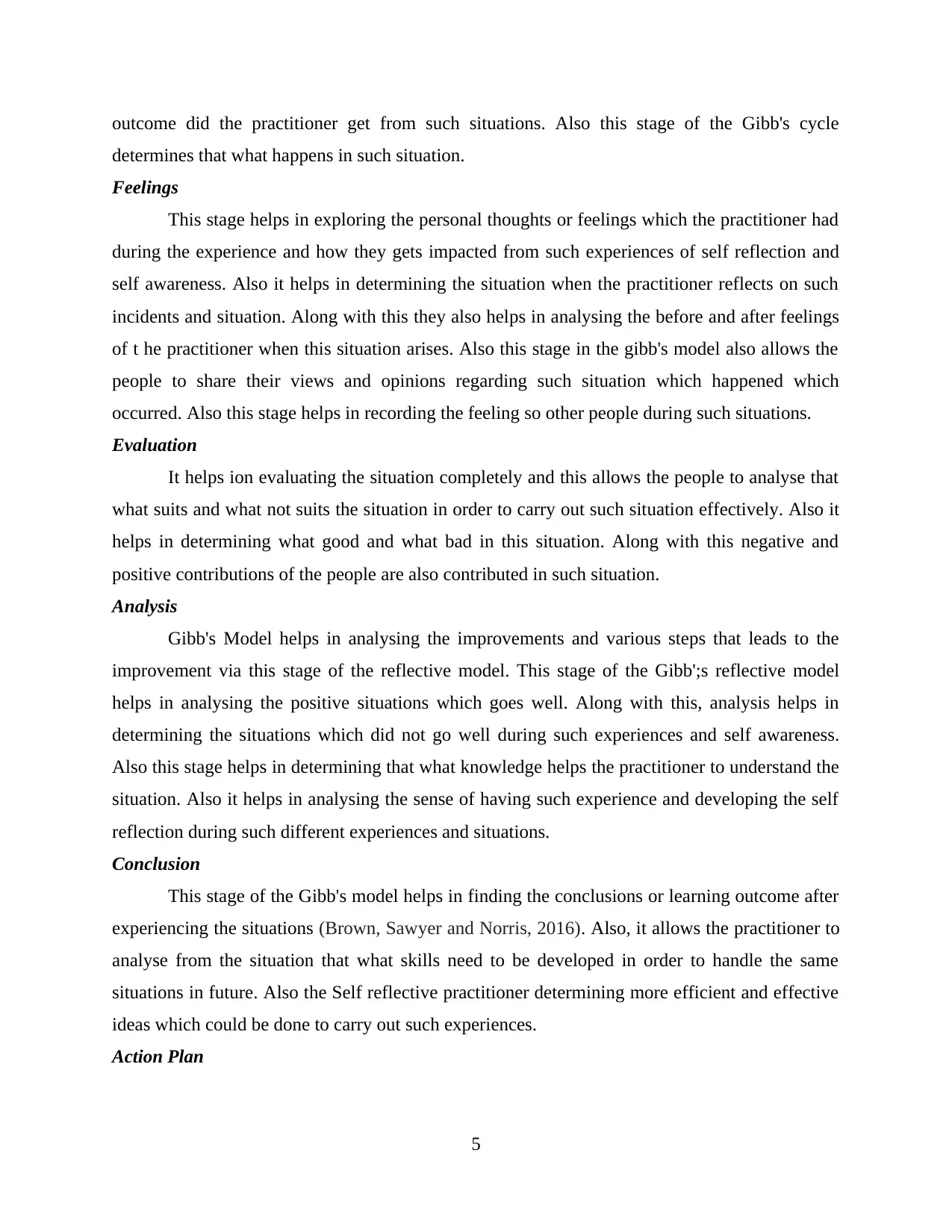
outcome did the practitioner get from such situations. Also this stage of the Gibb's cycle
determines that what happens in such situation.
Feelings
This stage helps in exploring the personal thoughts or feelings which the practitioner had
during the experience and how they gets impacted from such experiences of self reflection and
self awareness. Also it helps in determining the situation when the practitioner reflects on such
incidents and situation. Along with this they also helps in analysing the before and after feelings
of t he practitioner when this situation arises. Also this stage in the gibb's model also allows the
people to share their views and opinions regarding such situation which happened which
occurred. Also this stage helps in recording the feeling so other people during such situations.
Evaluation
It helps ion evaluating the situation completely and this allows the people to analyse that
what suits and what not suits the situation in order to carry out such situation effectively. Also it
helps in determining what good and what bad in this situation. Along with this negative and
positive contributions of the people are also contributed in such situation.
Analysis
Gibb's Model helps in analysing the improvements and various steps that leads to the
improvement via this stage of the reflective model. This stage of the Gibb';s reflective model
helps in analysing the positive situations which goes well. Along with this, analysis helps in
determining the situations which did not go well during such experiences and self awareness.
Also this stage helps in determining that what knowledge helps the practitioner to understand the
situation. Also it helps in analysing the sense of having such experience and developing the self
reflection during such different experiences and situations.
Conclusion
This stage of the Gibb's model helps in finding the conclusions or learning outcome after
experiencing the situations (Brown, Sawyer and Norris, 2016). Also, it allows the practitioner to
analyse from the situation that what skills need to be developed in order to handle the same
situations in future. Also the Self reflective practitioner determining more efficient and effective
ideas which could be done to carry out such experiences.
Action Plan
5
determines that what happens in such situation.
Feelings
This stage helps in exploring the personal thoughts or feelings which the practitioner had
during the experience and how they gets impacted from such experiences of self reflection and
self awareness. Also it helps in determining the situation when the practitioner reflects on such
incidents and situation. Along with this they also helps in analysing the before and after feelings
of t he practitioner when this situation arises. Also this stage in the gibb's model also allows the
people to share their views and opinions regarding such situation which happened which
occurred. Also this stage helps in recording the feeling so other people during such situations.
Evaluation
It helps ion evaluating the situation completely and this allows the people to analyse that
what suits and what not suits the situation in order to carry out such situation effectively. Also it
helps in determining what good and what bad in this situation. Along with this negative and
positive contributions of the people are also contributed in such situation.
Analysis
Gibb's Model helps in analysing the improvements and various steps that leads to the
improvement via this stage of the reflective model. This stage of the Gibb';s reflective model
helps in analysing the positive situations which goes well. Along with this, analysis helps in
determining the situations which did not go well during such experiences and self awareness.
Also this stage helps in determining that what knowledge helps the practitioner to understand the
situation. Also it helps in analysing the sense of having such experience and developing the self
reflection during such different experiences and situations.
Conclusion
This stage of the Gibb's model helps in finding the conclusions or learning outcome after
experiencing the situations (Brown, Sawyer and Norris, 2016). Also, it allows the practitioner to
analyse from the situation that what skills need to be developed in order to handle the same
situations in future. Also the Self reflective practitioner determining more efficient and effective
ideas which could be done to carry out such experiences.
Action Plan
5
Paraphrase This Document
Need a fresh take? Get an instant paraphrase of this document with our AI Paraphraser
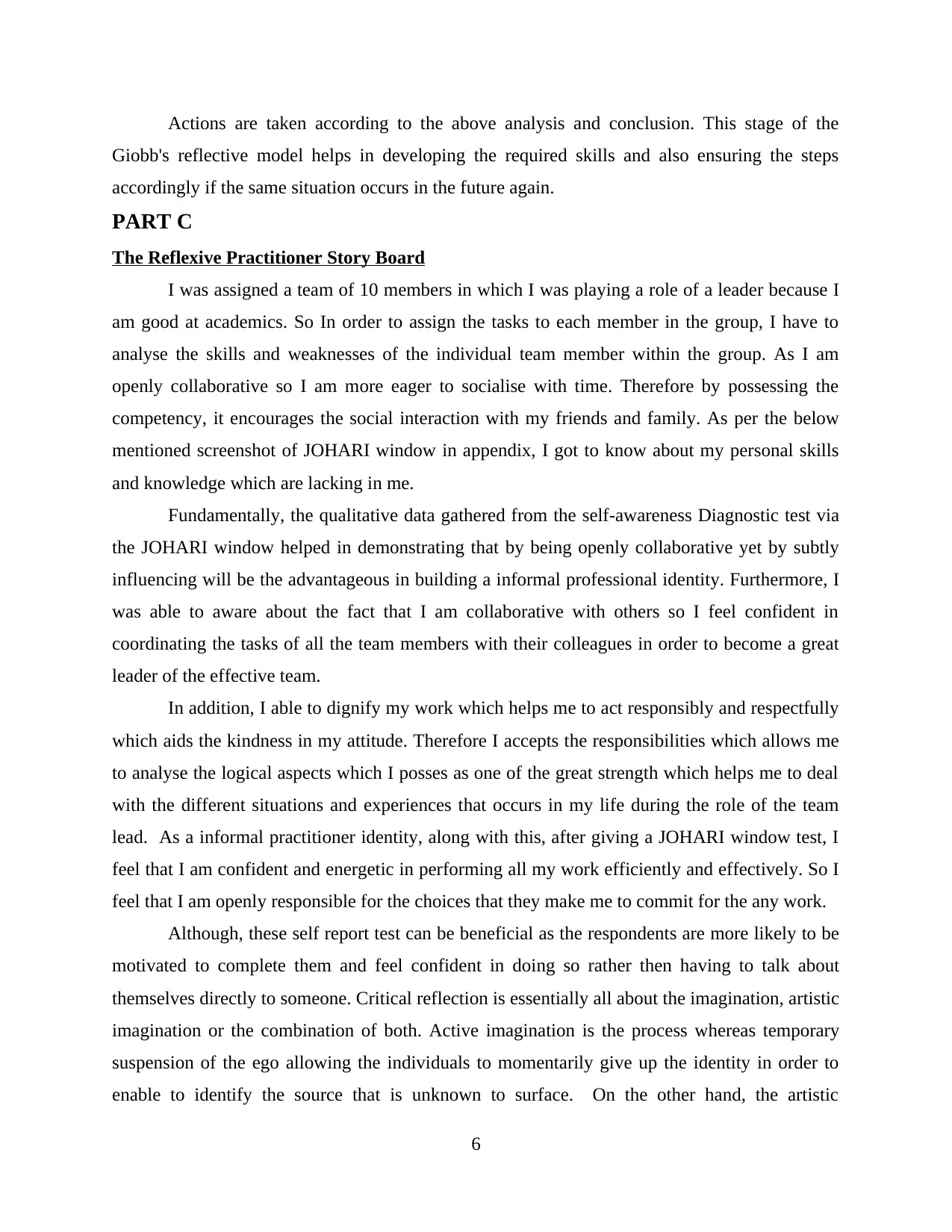
Actions are taken according to the above analysis and conclusion. This stage of the
Giobb's reflective model helps in developing the required skills and also ensuring the steps
accordingly if the same situation occurs in the future again.
PART C
The Reflexive Practitioner Story Board
I was assigned a team of 10 members in which I was playing a role of a leader because I
am good at academics. So In order to assign the tasks to each member in the group, I have to
analyse the skills and weaknesses of the individual team member within the group. As I am
openly collaborative so I am more eager to socialise with time. Therefore by possessing the
competency, it encourages the social interaction with my friends and family. As per the below
mentioned screenshot of JOHARI window in appendix, I got to know about my personal skills
and knowledge which are lacking in me.
Fundamentally, the qualitative data gathered from the self-awareness Diagnostic test via
the JOHARI window helped in demonstrating that by being openly collaborative yet by subtly
influencing will be the advantageous in building a informal professional identity. Furthermore, I
was able to aware about the fact that I am collaborative with others so I feel confident in
coordinating the tasks of all the team members with their colleagues in order to become a great
leader of the effective team.
In addition, I able to dignify my work which helps me to act responsibly and respectfully
which aids the kindness in my attitude. Therefore I accepts the responsibilities which allows me
to analyse the logical aspects which I posses as one of the great strength which helps me to deal
with the different situations and experiences that occurs in my life during the role of the team
lead. As a informal practitioner identity, along with this, after giving a JOHARI window test, I
feel that I am confident and energetic in performing all my work efficiently and effectively. So I
feel that I am openly responsible for the choices that they make me to commit for the any work.
Although, these self report test can be beneficial as the respondents are more likely to be
motivated to complete them and feel confident in doing so rather then having to talk about
themselves directly to someone. Critical reflection is essentially all about the imagination, artistic
imagination or the combination of both. Active imagination is the process whereas temporary
suspension of the ego allowing the individuals to momentarily give up the identity in order to
enable to identify the source that is unknown to surface. On the other hand, the artistic
6
Giobb's reflective model helps in developing the required skills and also ensuring the steps
accordingly if the same situation occurs in the future again.
PART C
The Reflexive Practitioner Story Board
I was assigned a team of 10 members in which I was playing a role of a leader because I
am good at academics. So In order to assign the tasks to each member in the group, I have to
analyse the skills and weaknesses of the individual team member within the group. As I am
openly collaborative so I am more eager to socialise with time. Therefore by possessing the
competency, it encourages the social interaction with my friends and family. As per the below
mentioned screenshot of JOHARI window in appendix, I got to know about my personal skills
and knowledge which are lacking in me.
Fundamentally, the qualitative data gathered from the self-awareness Diagnostic test via
the JOHARI window helped in demonstrating that by being openly collaborative yet by subtly
influencing will be the advantageous in building a informal professional identity. Furthermore, I
was able to aware about the fact that I am collaborative with others so I feel confident in
coordinating the tasks of all the team members with their colleagues in order to become a great
leader of the effective team.
In addition, I able to dignify my work which helps me to act responsibly and respectfully
which aids the kindness in my attitude. Therefore I accepts the responsibilities which allows me
to analyse the logical aspects which I posses as one of the great strength which helps me to deal
with the different situations and experiences that occurs in my life during the role of the team
lead. As a informal practitioner identity, along with this, after giving a JOHARI window test, I
feel that I am confident and energetic in performing all my work efficiently and effectively. So I
feel that I am openly responsible for the choices that they make me to commit for the any work.
Although, these self report test can be beneficial as the respondents are more likely to be
motivated to complete them and feel confident in doing so rather then having to talk about
themselves directly to someone. Critical reflection is essentially all about the imagination, artistic
imagination or the combination of both. Active imagination is the process whereas temporary
suspension of the ego allowing the individuals to momentarily give up the identity in order to
enable to identify the source that is unknown to surface. On the other hand, the artistic
6
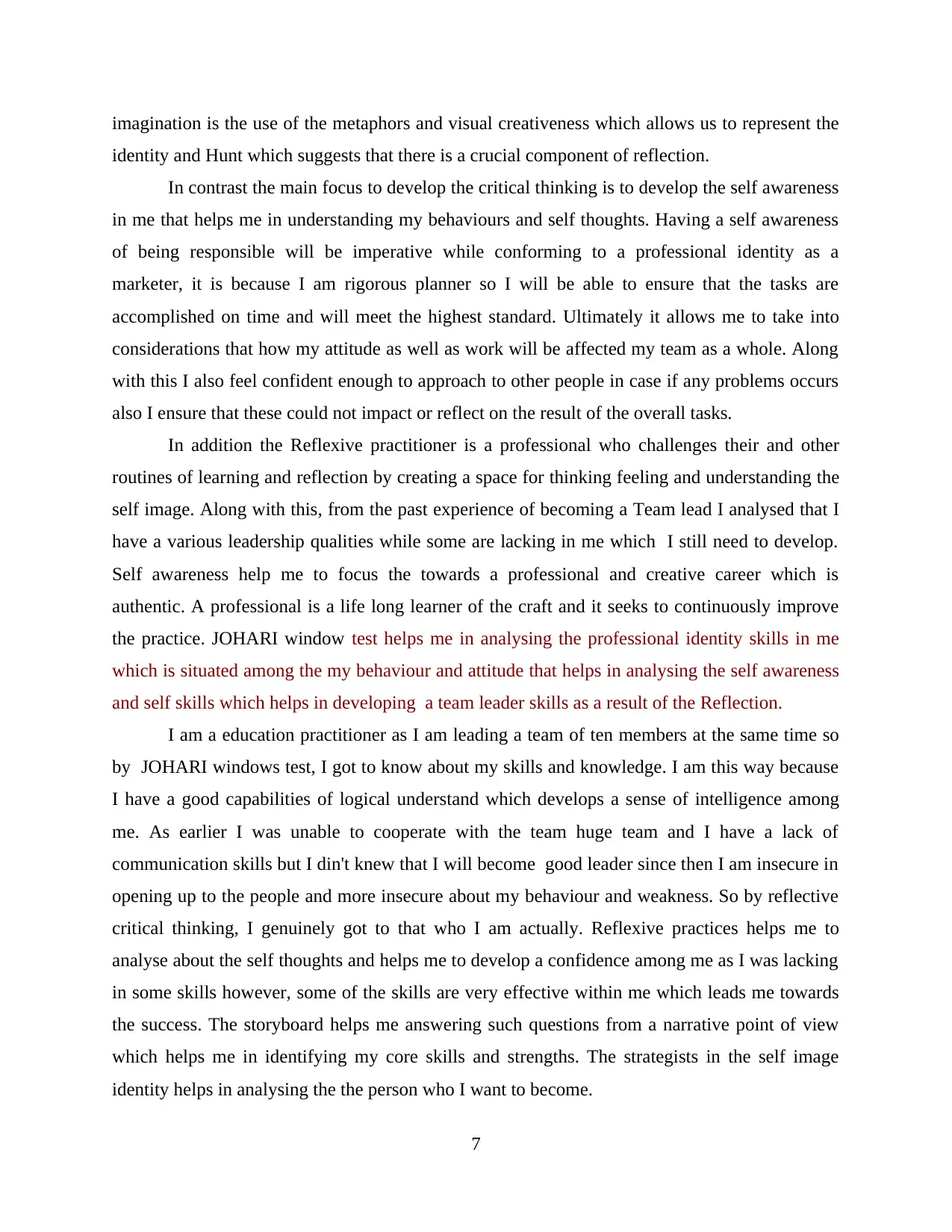
imagination is the use of the metaphors and visual creativeness which allows us to represent the
identity and Hunt which suggests that there is a crucial component of reflection.
In contrast the main focus to develop the critical thinking is to develop the self awareness
in me that helps me in understanding my behaviours and self thoughts. Having a self awareness
of being responsible will be imperative while conforming to a professional identity as a
marketer, it is because I am rigorous planner so I will be able to ensure that the tasks are
accomplished on time and will meet the highest standard. Ultimately it allows me to take into
considerations that how my attitude as well as work will be affected my team as a whole. Along
with this I also feel confident enough to approach to other people in case if any problems occurs
also I ensure that these could not impact or reflect on the result of the overall tasks.
In addition the Reflexive practitioner is a professional who challenges their and other
routines of learning and reflection by creating a space for thinking feeling and understanding the
self image. Along with this, from the past experience of becoming a Team lead I analysed that I
have a various leadership qualities while some are lacking in me which I still need to develop.
Self awareness help me to focus the towards a professional and creative career which is
authentic. A professional is a life long learner of the craft and it seeks to continuously improve
the practice. JOHARI window test helps me in analysing the professional identity skills in me
which is situated among the my behaviour and attitude that helps in analysing the self awareness
and self skills which helps in developing a team leader skills as a result of the Reflection.
I am a education practitioner as I am leading a team of ten members at the same time so
by JOHARI windows test, I got to know about my skills and knowledge. I am this way because
I have a good capabilities of logical understand which develops a sense of intelligence among
me. As earlier I was unable to cooperate with the team huge team and I have a lack of
communication skills but I din't knew that I will become good leader since then I am insecure in
opening up to the people and more insecure about my behaviour and weakness. So by reflective
critical thinking, I genuinely got to that who I am actually. Reflexive practices helps me to
analyse about the self thoughts and helps me to develop a confidence among me as I was lacking
in some skills however, some of the skills are very effective within me which leads me towards
the success. The storyboard helps me answering such questions from a narrative point of view
which helps me in identifying my core skills and strengths. The strategists in the self image
identity helps in analysing the the person who I want to become.
7
identity and Hunt which suggests that there is a crucial component of reflection.
In contrast the main focus to develop the critical thinking is to develop the self awareness
in me that helps me in understanding my behaviours and self thoughts. Having a self awareness
of being responsible will be imperative while conforming to a professional identity as a
marketer, it is because I am rigorous planner so I will be able to ensure that the tasks are
accomplished on time and will meet the highest standard. Ultimately it allows me to take into
considerations that how my attitude as well as work will be affected my team as a whole. Along
with this I also feel confident enough to approach to other people in case if any problems occurs
also I ensure that these could not impact or reflect on the result of the overall tasks.
In addition the Reflexive practitioner is a professional who challenges their and other
routines of learning and reflection by creating a space for thinking feeling and understanding the
self image. Along with this, from the past experience of becoming a Team lead I analysed that I
have a various leadership qualities while some are lacking in me which I still need to develop.
Self awareness help me to focus the towards a professional and creative career which is
authentic. A professional is a life long learner of the craft and it seeks to continuously improve
the practice. JOHARI window test helps me in analysing the professional identity skills in me
which is situated among the my behaviour and attitude that helps in analysing the self awareness
and self skills which helps in developing a team leader skills as a result of the Reflection.
I am a education practitioner as I am leading a team of ten members at the same time so
by JOHARI windows test, I got to know about my skills and knowledge. I am this way because
I have a good capabilities of logical understand which develops a sense of intelligence among
me. As earlier I was unable to cooperate with the team huge team and I have a lack of
communication skills but I din't knew that I will become good leader since then I am insecure in
opening up to the people and more insecure about my behaviour and weakness. So by reflective
critical thinking, I genuinely got to that who I am actually. Reflexive practices helps me to
analyse about the self thoughts and helps me to develop a confidence among me as I was lacking
in some skills however, some of the skills are very effective within me which leads me towards
the success. The storyboard helps me answering such questions from a narrative point of view
which helps me in identifying my core skills and strengths. The strategists in the self image
identity helps in analysing the the person who I want to become.
7
⊘ This is a preview!⊘
Do you want full access?
Subscribe today to unlock all pages.

Trusted by 1+ million students worldwide
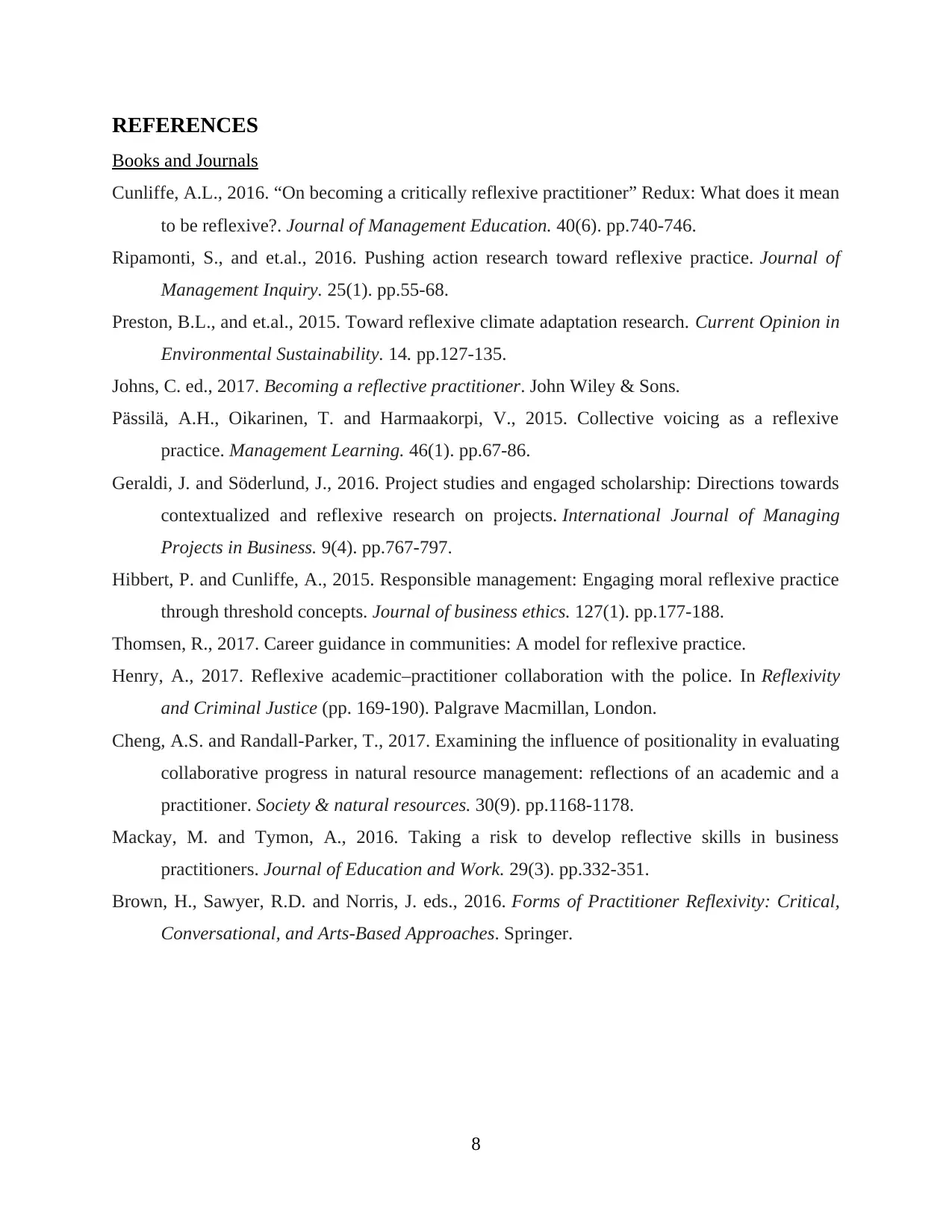
REFERENCES
Books and Journals
Cunliffe, A.L., 2016. “On becoming a critically reflexive practitioner” Redux: What does it mean
to be reflexive?. Journal of Management Education. 40(6). pp.740-746.
Ripamonti, S., and et.al., 2016. Pushing action research toward reflexive practice. Journal of
Management Inquiry. 25(1). pp.55-68.
Preston, B.L., and et.al., 2015. Toward reflexive climate adaptation research. Current Opinion in
Environmental Sustainability. 14. pp.127-135.
Johns, C. ed., 2017. Becoming a reflective practitioner. John Wiley & Sons.
Pässilä, A.H., Oikarinen, T. and Harmaakorpi, V., 2015. Collective voicing as a reflexive
practice. Management Learning. 46(1). pp.67-86.
Geraldi, J. and Söderlund, J., 2016. Project studies and engaged scholarship: Directions towards
contextualized and reflexive research on projects. International Journal of Managing
Projects in Business. 9(4). pp.767-797.
Hibbert, P. and Cunliffe, A., 2015. Responsible management: Engaging moral reflexive practice
through threshold concepts. Journal of business ethics. 127(1). pp.177-188.
Thomsen, R., 2017. Career guidance in communities: A model for reflexive practice.
Henry, A., 2017. Reflexive academic–practitioner collaboration with the police. In Reflexivity
and Criminal Justice (pp. 169-190). Palgrave Macmillan, London.
Cheng, A.S. and Randall-Parker, T., 2017. Examining the influence of positionality in evaluating
collaborative progress in natural resource management: reflections of an academic and a
practitioner. Society & natural resources. 30(9). pp.1168-1178.
Mackay, M. and Tymon, A., 2016. Taking a risk to develop reflective skills in business
practitioners. Journal of Education and Work. 29(3). pp.332-351.
Brown, H., Sawyer, R.D. and Norris, J. eds., 2016. Forms of Practitioner Reflexivity: Critical,
Conversational, and Arts-Based Approaches. Springer.
8
Books and Journals
Cunliffe, A.L., 2016. “On becoming a critically reflexive practitioner” Redux: What does it mean
to be reflexive?. Journal of Management Education. 40(6). pp.740-746.
Ripamonti, S., and et.al., 2016. Pushing action research toward reflexive practice. Journal of
Management Inquiry. 25(1). pp.55-68.
Preston, B.L., and et.al., 2015. Toward reflexive climate adaptation research. Current Opinion in
Environmental Sustainability. 14. pp.127-135.
Johns, C. ed., 2017. Becoming a reflective practitioner. John Wiley & Sons.
Pässilä, A.H., Oikarinen, T. and Harmaakorpi, V., 2015. Collective voicing as a reflexive
practice. Management Learning. 46(1). pp.67-86.
Geraldi, J. and Söderlund, J., 2016. Project studies and engaged scholarship: Directions towards
contextualized and reflexive research on projects. International Journal of Managing
Projects in Business. 9(4). pp.767-797.
Hibbert, P. and Cunliffe, A., 2015. Responsible management: Engaging moral reflexive practice
through threshold concepts. Journal of business ethics. 127(1). pp.177-188.
Thomsen, R., 2017. Career guidance in communities: A model for reflexive practice.
Henry, A., 2017. Reflexive academic–practitioner collaboration with the police. In Reflexivity
and Criminal Justice (pp. 169-190). Palgrave Macmillan, London.
Cheng, A.S. and Randall-Parker, T., 2017. Examining the influence of positionality in evaluating
collaborative progress in natural resource management: reflections of an academic and a
practitioner. Society & natural resources. 30(9). pp.1168-1178.
Mackay, M. and Tymon, A., 2016. Taking a risk to develop reflective skills in business
practitioners. Journal of Education and Work. 29(3). pp.332-351.
Brown, H., Sawyer, R.D. and Norris, J. eds., 2016. Forms of Practitioner Reflexivity: Critical,
Conversational, and Arts-Based Approaches. Springer.
8
Paraphrase This Document
Need a fresh take? Get an instant paraphrase of this document with our AI Paraphraser
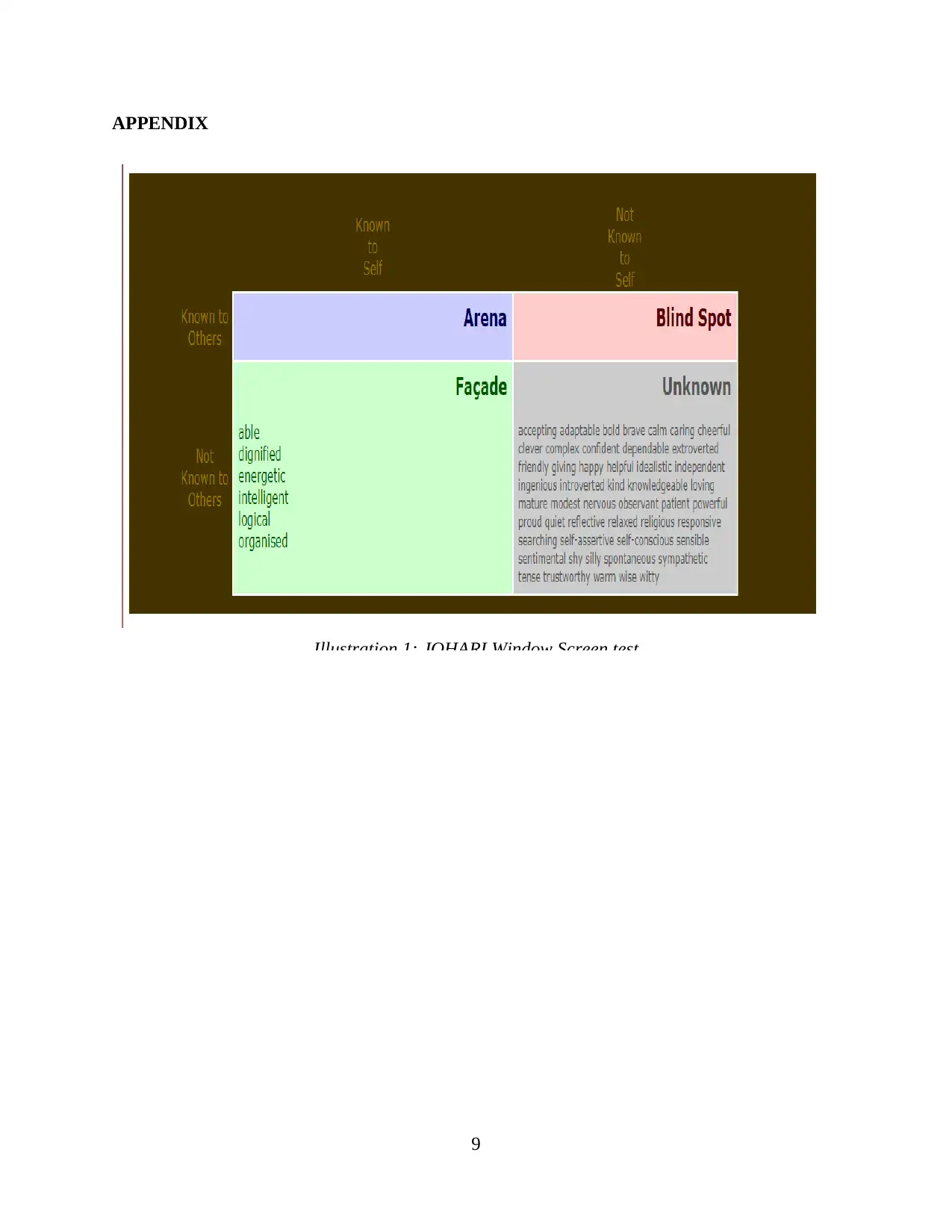
APPENDIX
9
Illustration 1: JOHARI Window Screen test
9
Illustration 1: JOHARI Window Screen test
1 out of 11
Related Documents
Your All-in-One AI-Powered Toolkit for Academic Success.
+13062052269
info@desklib.com
Available 24*7 on WhatsApp / Email
![[object Object]](/_next/static/media/star-bottom.7253800d.svg)
Unlock your academic potential
Copyright © 2020–2026 A2Z Services. All Rights Reserved. Developed and managed by ZUCOL.





